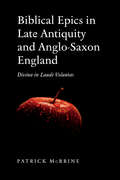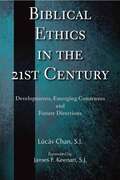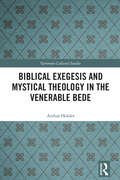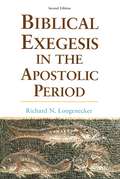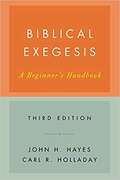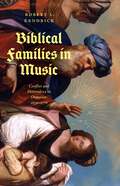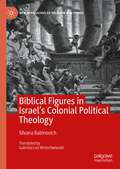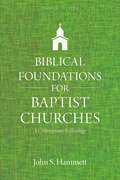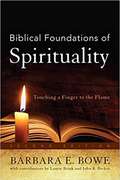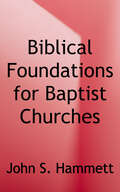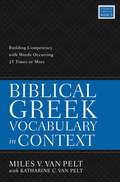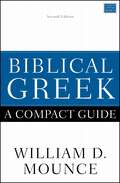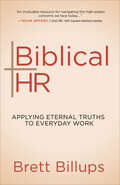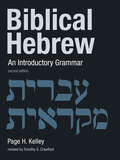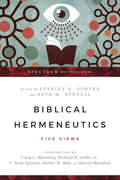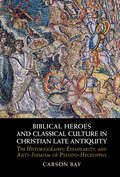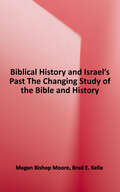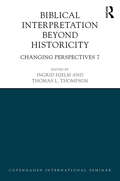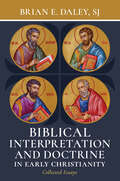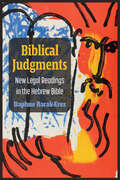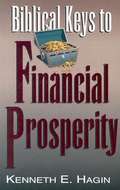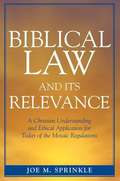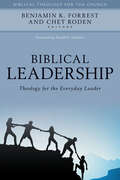- Table View
- List View
Biblical Epics in Late Antiquity and Anglo-Saxon England: Divina in Laude Voluntas
by Patrick McbrineBiblical poetry, written between the fourth and eleventh centuries, is an eclectic body of literature that disseminated popular knowledge of the Bible across Europe. Composed mainly in Latin and subsequently in Old English, biblical versification has much to tell us about the interpretations, genre preferences, reading habits, and pedagogical aims of medieval Christian readers. Biblical Epics in Late Antiquity and Anglo-Saxon England provides an accessible introduction to biblical epic poetry. Patrick McBrine’s erudite analysis of the writings of Juvencus, Cyprianus, Arator, Bede, Alcuin, and more reveals the development of a hybridized genre of writing that informed and delighted its Christian audiences to such an extent it was copied and promoted for the better part of a millennium. The volume contains many first-time readings and discussions of poems and passages which have long lain dormant and offers new evidence for the reception of the Bible in late Antiquity and the Middle Ages.
Biblical Ethics In The 21st Century: Developments, Emerging Consensus, And Future Directions
by Lúcás ChanReviews and critiques the major attempts at biblical ethics over the past twenty years by both biblical theologians and theological ethicists, focusing on New Testament ethics as an illustration.
Biblical Exegesis and Mystical Theology in the Venerable Bede (Variorum Collected Studies)
by Arthur HolderBiblical Exegesis and Mystical Theology in the Venerable Bede brings together 17 essays by Arthur Holder exploring the theology and spirituality found in Bede’s biblical commentaries and homilies. The volume shows that Bede was both a masterful student of received tradition and a creative thinker concerned to address the needs and interests of his audience of Christian pastors and teachers in the eighth-century Northumbrian church.Although Bede is best known as the author of The Ecclesiastical History of the English People, the last half-century of scholarship has demonstrated the sophistication and vast influence of his work in the fields of grammar, biblical interpretation, hagiography, poetry, computus, natural science, and theology. The chapters in this volume show how Bede’s exegesis was integrally connected with his work in all those genres and with the monumental artistic productions of his monastery such as the illuminated bible manuscript known as the Codex Amiatinus. The five parts of the book deal with Bede as teacher and biblical scholar, his interpretations of the tabernacle and the temple, his commentary on the Song of Songs, his attitudes toward philosophy and heresy, and his mystical theology.This book will be of interest to students of Christian theology, mysticism, the development of biblical interpretation, and the history of early medieval England.
Biblical Exegesis in the Apostolic Period
by Richard N. LongeneckerThe discovery of the Dead Sea Scrolls, the Nag Hammadi texts, and new Targums has greatly increased scholarly interest in the relationship between the New Testament and first -century Judaism. This critically acclaimed study by Richard Longenecker sheds light on this relationship by exploring the methods the earliest Christians used to interpret the Old Testament. By comparing the first Christian writings with Jewish documents from the same period, Longenecker helps to discern both the key differences between Christianity and Judaism and the Judaic roots of the Christian faith. This revised edition of Biblical Exegesis in the Apostolic Period brings Longenecker's valued work up to date with current research in this important field of study.
Biblical Exegesis: A Beginner's Handbook
by Carl R. Holladay John H. HayesJohn Hayes and Carl Holladay have thoroughly revised and expanded this best-selling textbook, adding new chapters on emerging methods of interpretation and the use of computer technology for exegesis. All bibliographies have been updated, and Scripture has been converted to the NRSV. This new edition retains the features of the early editions: a minimum of technical terms, solid introductory guidelines in exegetical methods, and a valuable presentation of exegetical theory and practice. It is ideal for general introductory exegesis courses, introductions to the Old and New Testaments, and introduction to preaching, as well as for pastors and lay leaders.
Biblical Families in Music: Conflict and Heterodoxy in Oratorios, 1670–1770
by Robert L. KendrickExamines how stories of biblical families were reconfigured and projected in the genre of the oratorio, a form of sacred opera, in the seventeenth and eighteenth centuries. Based to a great extent on the Old Testament, the largely Catholic musical-dramatic genre was popular in Italy, Austria, and southern Germany in the seventeenth and eighteenth centuries. Biblical Families in Music reveals how difficult stories of fratricide, child sacrifice, death, and forbidden love performed a didactic function in oratorios, teaching early modern audiences about piety and the rules of proper family life. In the century after 1670, the heavily adapted tales of Abraham and Isaac, Cain and Abel, and the Egyptian slave Hagar and her son Ishmael were set to music by figures such as Alessandro Scarlatti and Antonio Sacchini and performed during Lent in churches and other sacred spaces for an audience of court nobility, clergy, and the urban patriciate. By examining the resonance of Catholic oratorios within predominantly upper-class social realities, the book broadens our cultural understanding of the early modern European family and underscores the centrality of family and familial relation to social position, devotional taste, and identity.
Biblical Figures in Israel's Colonial Political Theology (New Approaches to Religion and Power)
by Silvana RabinovichThis book reveals and counteracts the misuse of biblical texts and figures in political theology, in an attempt to decolonialize the reading of the Old Testament. In the framework of Critical Theory, the book questions readings that inform the State of Israel's military apparatus. It embraces Martin Buber’s pacifist vision and Edward Said’s perspective on Orientalism, influenced by critical authors such as Amnon Raz Krakotzkin, Ilan Pappé, Shlomo Sand, Idith Zertal, and Enrique Dussel’s.
Biblical Foundations For Baptist Churches: A Contemporary Ecclesiology
by John S. HammettAn updated examination of ecclesiology from a Baptist perspective In this useful book, professor and former pastor John Hammett helps church leaders think through foundational questions about the nature of the church. Blending biblical teaching and practical ministry experience, Hammett presents a comprehensive ecclesiology from a historic Baptist perspective, examining crucial contemporary issues such as church discipline, the role of elders, and church ministry in a post-Christian culture. This second edition contains updates throughout, including: Substantive changes to chapters on the nature of the church, Baptist church polity, and deacons An expanded chapter on baptism and the Lord’s Supper A thoroughly revised chapter on church models like multisite churches and missional churches A brand-new chapter on meaningful church membership
Biblical Foundations For Worship
by Vernon WhaleyWelcome to WRSP 510 Biblical Foundations for Worship. This course presents principles of Old and New Testament worship. A study comparing God's revelation to man is made to man's response to God. Biblical studies include, but are not limited to: The Old Testament- the Pentateuch, Books of History, Books of Wisdom and Poetry, and the Prophets. The New Testament - Worship as taught by Jesus; Worship given to Jesus; Worship in the Early Church; Christology of Worship; and, Worship in Eternity. Included are principles for worship and brief discussions of pre-tabernacle, tabernacle, temple, and synagogue worship. Students engage in semester projects that include the study of worship practices by select Biblical personalities.
Biblical Foundations Of Spirituality: Touching A Finger To The Flame
by John R. Barker Barbara E. Bowe Laurie BrinkBiblical Foundations of Spirituality invites readers to “touch a finger to the flame” of the Bible by offering guidance on what, how, and why to read Scripture as a source of spiritual nourishment. The second edition builds on Barbara Bowe’s acclaimed book with two new chapters by Laurie Brink and John R. Barker introducing key theological concepts and exploring how biblical spirituality was first experienced and expressed in early Christian communities. The book begins by exploring the many meanings of the word “spirituality,” then leads readers through the Bible—from Genesis to Revelation—to develop a biblically based spirituality that can serve as a compass in the challenges of life. Updated to reference the latest scholarship, this book helps make the Bible more accessible and shows how it can be relevant to life today. The book stresses the spiritual dimension of biblical figures’ search for God and shows how their insights about God—from successes to dead ends—can reflect our contemporary searching and struggles. Biblical Foundations of Spirituality reveals the spiritual wisdom of the Bible, connecting it with everyday life and spirituality. With a chronology, reflection questions, a glossary, and updated notes and bibliography, as well as two new chapters, the second edition of Biblical Foundations of Spirituality is ideal for classroom, parish, or individual reading.
Biblical Foundations for Baptist Churches: A Contemporary Ecclesiology
by John S. HammettIn this book, professor and former pastor John Hammett helps church leaders think through foundational questions about the nature of the church. Blending biblical teaching and practical ministry experience, Hammett presents a comprehensive ecclesiology from a historic Baptist perspective, examining crucial contemporary
Biblical Greek Vocabulary in Context: Building Competency with Words Occurring 25 Times or More
by Miles V. Van PeltBiblical Greek Vocabulary in Context by Miles V. Van Pelt is designed to reinforce a student's basic Greek vocabulary by presenting words that occur twenty-five times or more in the context of the Greek New Testament.Miles Van Pelt collates all 513 of these Greek words into approximately 200 key biblical verses and/or verse fragments to help students practice reading them in their literary context and thus improve their Greek vocabulary retention. Rather than rote memorization, Van Pelt's approach teaches word meaning through each word's naturally occurring context--the way people naturally learn languages.The book includes two primary sections:The first section provides room for students to write their own glosses of the biblical verse and to parse as they feel necessary. An English translation is also provided, and any term that appears less than twenty-five times is glossed. Proper names are identified with gray text.The second section of the book provides the same biblical verses from the first section but with minimal room to write glosses and parse and without an English translation for aid. The end of the book includes a Greek-English lexicon of all the words occurring twenty-five times or more in the Greek New Testament.
Biblical Greek: Second Edition
by William D. MounceBiblical Greek: A Compact Guide, Second Edition by William D. Mounce is a handy, at-a-glance reference for students, pastors, and teachers. It follows the organization and format of the fourth edition of Basics of Biblical Greek Grammar, but it is also usable by students who learned with a different grammar. By limiting its discussion to the "nuts and bolts," Greek language students working on translation and exegesis will more quickly and easily find the relevant grammatical refreshers. Students can, for example, check on the range of meaning for a particular word or make sure they remember how aorist participles function in a sentence. The paradigms, word lists, and basic discussions in Biblical Greek: A Compact Guide Second Edition points students in the right direction and allow them to focus on more advanced Greek study.
Biblical HR: Applying Eternal Truths to Everyday Work
by Brett BillupsA unique, practical step-by-step guide to deal with specific, employee workplace issues from a biblical perspective.
Biblical Hebrew: An Introductory Grammar
by Page H. KelleyA standard, much-used textbook updated and improved Comprehensive in scope, this carefully crafted introductory grammar of Biblical Hebrew offers easy-to-understand explanations, numerous biblical illustrations, and a wide range of imaginative, biblically based exercises. The book consists of thirty-one lessons, each presenting grammatical concepts with examples and numerous exercises judiciously selected from the biblical text. These lessons are accompanied by eleven complete verb charts, an extensive vocabulary list, a glossary of grammatical terms, and a subject index. In this second edition Timothy Crawford has updated the text throughout while preserving the Page Kelley approach that has made Biblical Hebrew so popular over the years.
Biblical Hermeneutics: Five Views (Spectrum Multiview Book Series)
by Stanley E. Porter Jr. Beth M. StovellFive experts in biblical hermeneutics gather here to state and defend their approach to the discipline. Contributors include: Craig Blomberg with the historical-critical/grammatical approach, Richard Gaffin with the redemptive-historical approach, Scott Spencer with the literary/postmodern approach, Robert Wall with the canonical approach and Merold Westphal with the philosophical/theological approach.
Biblical Heroes and Classical Culture in Christian Late Antiquity: The Historiography, Exemplarity, and Anti-Judaism of Pseudo-Hegesippus
by Carson BayIn this volume, Carson Bay focuses on an important but neglected work of Late Antiquity: Pseudo-Hegesippus' On the Destruction of Jerusalem (De Excidio Hierosolymitano), a Latin history of later Second Temple Judaism written during the fourth century CE. Bay explores the presence of so many Old Testament figures in a work that recounts the Roman-Jewish War (66–73 CE) and the destruction of Jerusalem in 70 CE. By applying the lens of Roman exemplarity to Pseudo-Hegesippus, he elucidates new facets of Biblical reception, history-writing, and anti-Judaism in a text from the formative first century of Christian Empire. The author also offers new insights into the Christian historiographical imagination and how Biblical heroes and Classical culture helped Christians to write anti-Jewish history. Revealing novel aspects of the influence of the Classical literary tradition on early Christian texts, this book also newly questions the age-old distinction between the Christian and the Classical (or 'pagan') in the ancient Mediterranean world.
Biblical History and Israel's Past: The Changing Study of the Bible and History
by Brad E. Kelle Megan Bishop MooreAlthough scholars have for centuries primarily been interested in using the study of ancient Israel to explain, illuminate, and clarify the biblical story, Megan Bishop Moore and Brad E. Kelle describe how scholars today seek more and more to tell the story of the past on its terms, drawing from both biblical and extrabiblical sources to illuminate ancient Israel and its neighbors without privileging the biblical perspective. Biblical History and Israel’s Past provides a comprehensive survey of how study of the Old Testament and the history of Israel has changed since the middle of the twentieth century. Moore and Kelle discuss significant trends in scholarship, trace the development of ideas since the 1970s, and summarize major scholars, viewpoints, issues, and developments.
Biblical Interpretation
by John BartonModern western critical study of the Bible has radically altered the fabric of Christian belief. This book explains what interpretation is and what special issues arise in biblical interpretation. The authors analyze the development of traditional literary and historical criticism and more recent social, scientific, and literary approaches, focusing on the key figures from Reimarus to Gerd Theissen, and exposing the underlying theological issues. What emerges is a pattern in the relationship between religious interests in the texts and the rational methods used to interpret them, providing guidance for a theologically sensitive use of the Bible today. The book includes an annotated index with detailed information on over 250 biblical scholars and other interpreters.
Biblical Interpretation Beyond Historicity: Changing Perspectives 7
by Thomas L. Thompson Ingrid HjelmBiblical Interpretation beyond Historicity evaluates the new perspectives that have emerged since the crisis over historicity in the 1970s and 80s in the field of biblical scholarship. Several new studies in the field, as well as the ‘deconstructive’ side of literary criticism that emerged from writers such as Derrida and Wittgenstein, among others, lead biblical scholars today to view the texts of the Bible more as literary narratives than as sources for a history of Israel. Increased interest in archaeological and anthropological studies in writing the history of Palestine and the ancient Near East leads to the need for an evidence-based history of Palestine. This volume analyses the consequences of the question: "If the Bible is not history, what is it then?" The editors, Hjelm and Thompson are members of the Copenhagen School, which was formed in the light of this question and the commitment to a new approach to both the history of Palestine and the Bible’s place in ancient history. This volume features essays from a range of highly regarded scholars, and is divided into three sections: "Beyond Historicity", which explores alternative historical roles for the Bible, "Greek Connections", which discusses the Bible’s context in the Hellenistic world and "Reception", which explores extra-biblical functions of biblical studies. Offering a unique gathering of scholars and challenging new theories, Biblical Interpretation beyond Historicity is invaluable to students in the field of Biblical and East Mediterranean Studies, and is a crucial resource for anyone working on both the archaeology and history of Palestine and the ancient Near East, and the religious development of Europe and the Near East.
Biblical Interpretation and Doctrine in Early Christianity: Collected Essays
by Brian E. Daley SJEssays on patristic biblical interpretation and doctrine, written by a renowned historical theologian Brian E. Daley, SJ, is a highly acclaimed scholar of early Christian theology. In a prolific career spanning more than forty years, he has published his research in a wide range of academic journals and edited collections; this book represents the first time that several of his studies of patristic biblical interpretation and doctrine have been brought together in one volume. The eighteen essays in this collection examine topics including patristic exegesis, Origen&’s De principiis, Cappadocian scriptural interpretation and doctrine, early Christian views on redemption and eschatology, and modern retrievals of patristic scriptural interpretation. This informative and insightful volume is an essential resource for theologians, exegetes interested in the history of interpretation, and theological libraries.
Biblical Judgments: New Legal Readings in the Hebrew Bible (Law, Meaning, And Violence)
by Daphne Barak-ErezBiblical Judgments invites readers to consider today's timeless dilemmas of law and government, social justice, and human rights, through the perspective of a text that has helped shape western society: the Hebrew Bible. By focusing on biblical narratives and literature rather than on traditional interpretations of biblical law, Daphne Barak-Erez is able to look beyond historic norms to concentrate on what Old Testament stories can reveal about the "big" issues. She discusses questions such as: What can modern-day governmental regulation learn from the exercise of food rationing in Egypt as a response to Pharaoh's dream of a future famine? How does social distancing in the time of Covid-19 compare with people sent outside the camp as a precautionary measure against bible-era plagues? What can promoters of social justice glean from the demands made to Moses that daughters should also inherit from their father when biblical law did not recognize inheritance rights of women? Rather than offering a historical study, Barak-Erez draws upon famous court decisions from around the world to root her analysis in modern law. Organized by subject matter, Biblical Judgments analyzes how the themes of law and government, judging and judges, human rights and social justice, criminal law, private law, and family and inheritance law are presented through a number of different stories. In recounting the compelling narratives of the Hebrew Bible, Biblical Judgments exposes their inherent legal tensions and what we can learn about legal dilemmas today.
Biblical Keys to Financial Prosperity
by Kenneth E. HaginGod wants His people to prosper financially. Biblical Keys to Financial Prosperity explains how believers can release their faith for finances and "eat the good of the land." Discusses faith actions which will help increase prosperity as well as actions to avoid.
Biblical Law and Its Relevance
by Joe M. SprinkleSprinkle (Old Testament, Crossroads College) explores the Pentateuch to find what Christians are to make of Mosaic law, based upon his understanding of how these principles serve as foundations for the Christian life and life in the world. He finds that all biblical laws are relevant for Christian believers, that understanding the Old Testament is a large part of understanding God's grace and that the Old Testament has a unique way of informing the moral system behind secular law. He explores the role of Mosaic law in a personal relationship with God and the applications to such topics as abortion, theft and deprivation of property, the notion of "clean v. unclean," purity, divorce, sexual ethics, war, and justice. Annotation ©2006 Book News, Inc. , Portland, OR (booknews. com)
Biblical Leadership: Theology for the Everyday Leader
by Benjamin K. ForrestBiblical Leadership takes the best of evangelical scholarship to make the leadership lessons of Scripture tangible for today's readers. All contributors are biblical scholars who not only think seriously about the texts covered in their individual chapters, but have committed their lives to teaching and living the truths therein. This volume walks through the sections of the Bible, gleaning insights from each biblical writer. Every chapter analyzes the original setting of the writing, extrapolates the leadership principles in the text, and provides advice on applying that theology of leadership. Presented in everyday language understandable to both professionals and practitioners, these lessons will equip current and upcoming leaders to make a Christlike impact.
